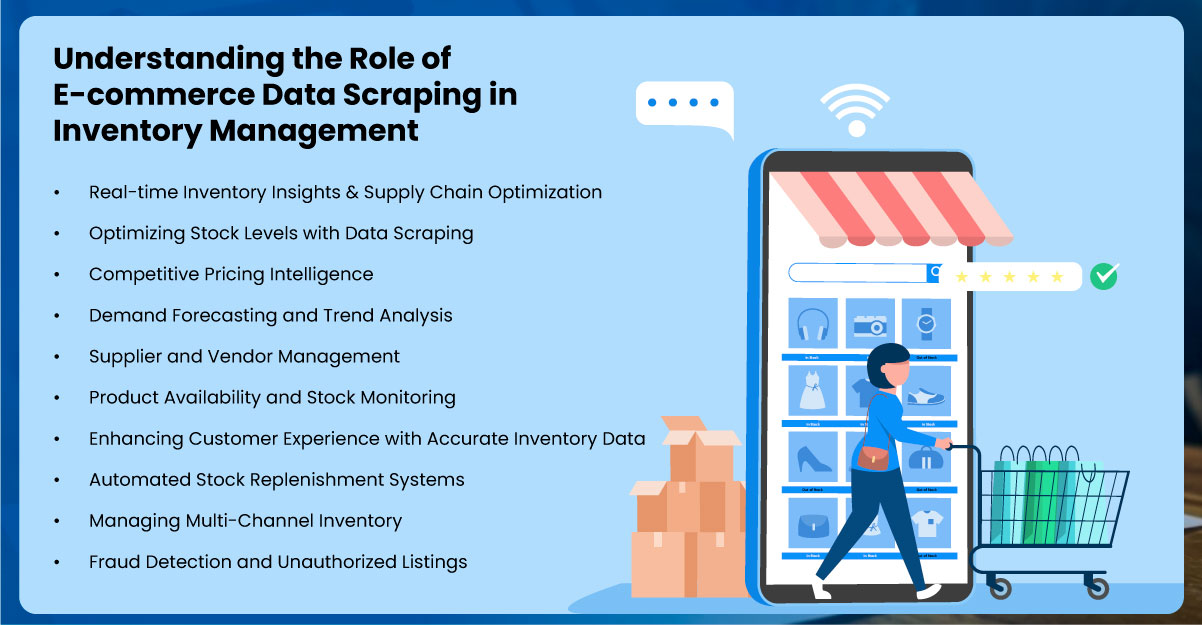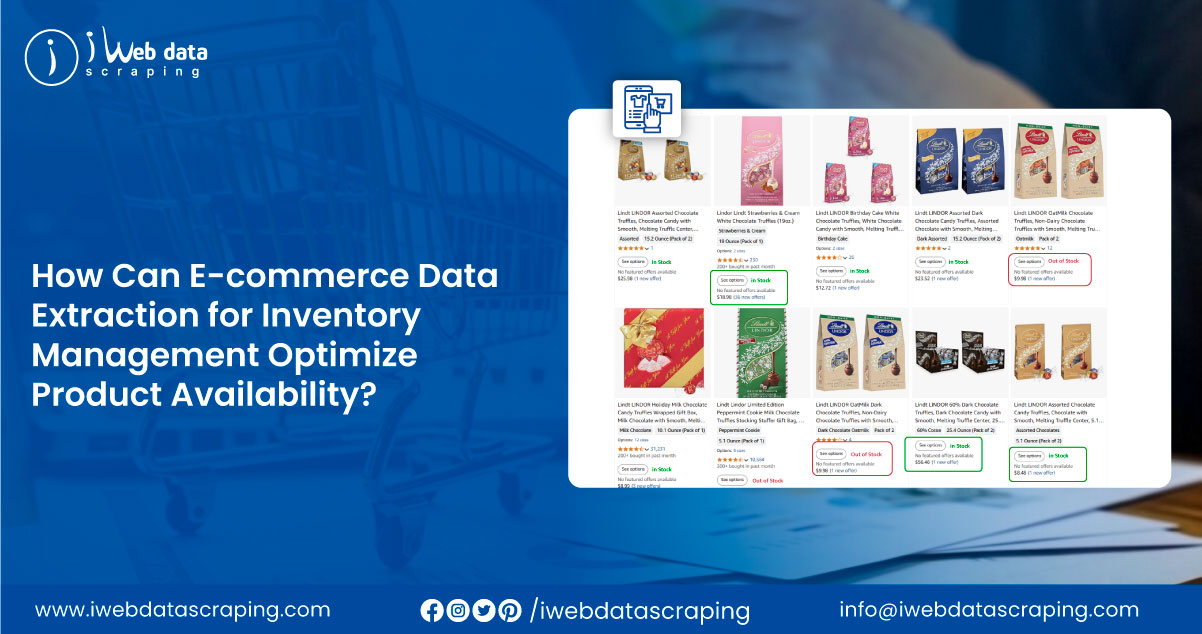Introduction
In today’s fast-paced digital marketplace, businesses must adopt Web Scraping for Efficient E-
commerce Inventory Management to stay competitive. E-commerce has made inventory
control more complex, necessitating advanced data collection methods. E-commerce Inventory
Optimization with Data Scraping Solutions enables companies to extract real-time product
data, monitor competitor pricing, and adjust stock levels dynamically. By leveraging web
scraping technology, businesses can prevent stockouts and overstocking while streamlining
supply chain operations. This data-driven approach ensures accurate forecasting, efficient
replenishment, and improved decision-making. With precise inventory insights, companies can
optimize product availability, enhance customer satisfaction, and boost profitability.
Moreover, E-commerce Data Extraction for Inventory Management empowers businesses to
identify trends and make proactive decisions regarding product procurement. This ensures that
businesses remain competitive by responding to market demands in real-time. Ultimately,
companies can achieve more effective inventory control and cost savings.
Understanding the Role of E-commerce Data Scraping in Inventory Management

E-commerce data scraping enables businesses to automate inventory tracking, optimize stock
levels, monitor competitor pricing, and forecast demand. It helps streamline supply chain
operations and enhances decision-making with real-time data insights. Listed below are the
roles of data scraping in inventory management:
-
Real-time Inventory Insights & Supply Chain Optimization:
Collecting and analyzing vast amounts of product data is critical for effective inventory management. Traditional inventory control methods rely on manual data entry and periodic stock audits, which are time-consuming and prone to errors. With Real-Time Inventory Management using E-commerce Data Scraping, businesses can automate data collection from various e-commerce platforms, gaining real-time insights into stock availability, pricing fluctuations, and consumer demand trends.
-
Optimizing Stock Levels with Data Scraping:
E-commerce businesses must balance demand and supply. Overstocking leads to excessive holding costs, while stockouts result in missed sales and dissatisfied customers. By scraping product data from e-commerce websites, businesses can monitor demand fluctuations and adjust inventory accordingly. E-commerce Inventory Tracking and Management using Data Scraping ensures businesses can make data-driven stock decisions. For example, retailers observing a spike in demand for a product category can increase procurement to avoid stock shortages. Conversely, if sales decline for a product, businesses can reduce stock levels to prevent overstocking and clearance losses.
-
Competitive Pricing Intelligence:
Pricing directly impacts demand and inventory management. E-commerce Data Intelligence helps businesses track competitor pricing in real-time to keep their pricing strategies competitive. By analyzing pricing trends across multiple platforms, businesses can adjust prices dynamically to maximize profitability while maintaining optimal stock levels. They can also respond to competitor price changes to sustain market competitiveness and prevent unsold inventory.
-
Demand Forecasting and Trend Analysis:
Accurate demand forecasting is essential for efficient inventory management. E-commerce Data Scraping Services allow businesses to analyze historical sales data, seasonal trends, and consumer preferences to identify purchasing patterns. This helps predict future demand trends and align inventory levels accordingly. For example, retailers can anticipate higher demand during Black Friday or Christmas and stock up in advance to meet customer expectations.
-
Supplier and Vendor Management:
Inventory management involves maintaining stock levels and coordinating with suppliers and vendors. E-commerce Data Scrapers provide insights into supplier performance, delivery times, and stock availability from various vendors. Businesses can compare bulk pricing from wholesale marketplaces to select the most cost-effective suppliers. This helps identify reliable vendors and optimize procurement strategies, improving supply chain efficiency.
-
Product Availability and Stock Monitoring:
One of the biggest challenges in e-commerce inventory management is tracking product availability across multiple sales channels. With E-Commerce Product and Review Datasets, businesses can monitor stock levels in real-time across different marketplaces and online stores. This ensures timely restocking decisions based on up-to-date product availability. Additionally, businesses can identify frequently out-of-stock products and prioritize their procurement.
-
Enhancing Customer Experience with Accurate Inventory Data:
Customer satisfaction is closely linked to inventory accuracy. Customers expect timely delivery and accurate stock information when placing an order. Ecommerce Data Scraping Services help businesses maintain precise stock records, reducing the chances of order cancellations due to stock unavailability. Additionally, by analyzing customer reviews and feedback from scraped data, businesses can identify inventory-related issues such as delayed shipments or defective products and take corrective actions.
-
Automated Stock Replenishment Systems:
Modern e-commerce businesses rely on automated stock replenishment systems to streamline inventory management. By integrating web scraping data with inventory management software, businesses can set predefined stock thresholds that trigger automatic reordering from suppliers when inventory levels fall below a certain point. This minimizes the risk of stockouts while ensuring businesses do not overstock slow-moving products. E-commerce Data Intelligence enhances overall efficiency in supply chain operations.
-
Fraud Detection and Unauthorized Listings:
Unauthorized sellers and counterfeit products pose a significant risk to e-commerce businesses. Ecommerce Data Scraping Services allow companies to monitor various online marketplaces for unauthorized listings of their products. By identifying counterfeit goods and unauthorized resellers, businesses can take legal action to protect their brand reputation and ensure that fake products do not dilute their inventory. Scraping data from customer reviews and seller ratings can help businesses detect fraudulent sellers and prevent inventory-related issues.
-
Managing Multi-Channel Inventory:
Many e-commerce businesses operate across multiple platforms, including websites, third-party marketplaces like Amazon and eBay, and social commerce channels. Managing inventory across these multiple channels can be complex and challenging. E-commerce Inventory Tracking and Management with Data Scraping enables businesses to synchronize stock levels across all sales channels, ensuring that inventory data remains consistent and current. This reduces the chances of overselling or underselling products and helps businesses maintain a seamless customer shopping experience.
The Future of E-commerce Data Scraping in Inventory Management

As e-commerce continues to evolve, the role of data scraping in inventory management will
become even more significant. Advanced scraping technologies powered by artificial
intelligence (AI) and machine learning (ML) will enable businesses to extract more granular
insights from vast datasets. Predictive analytics will further enhance demand forecasting
accuracy, allowing businesses to optimize inventory planning more precisely. Moreover, real-
time inventory tracking using IoT (Internet of Things) devices combined with scraped data will
revolutionize supply chain operations.
Another emerging trend is integrating blockchain technology with e-commerce data scraping
for inventory management. Blockchain’s decentralized ledger system can enhance transparency
in supply chains by providing verifiable and immutable records of stock movements, reducing
the risk of discrepancies and fraud.
Conclusion
E-commerce data scraping has transformed inventory management by giving businesses real-
time insights into product availability, demand trends, pricing fluctuations, and supplier
performance. By leveraging data scraping techniques, businesses can optimize stock levels,
enhance pricing intelligence, improve customer satisfaction, and streamline supply chain
operations. As technology advances, integrating AI, machine learning, and blockchain with web
scraping will further revolutionize inventory management in the e-commerce industry.
Companies that invest in robust data scraping strategies will be better positioned to adapt to
market changes, minimize inventory risks, and maximize profitability.
Experience top-notch web scraping service and mobile app scraping solutions with iWeb Data Scraping. Our skilled team excels in extracting various data sets, including retail store locations and beyond. Connect with us today to learn how our customized services can address your unique project needs, delivering the highest efficiency and dependability for all your data requirements.



